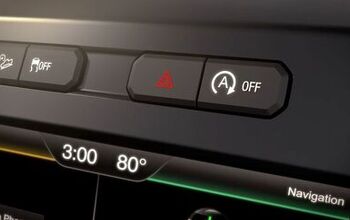QOTD: How Much Money Do You Need to Be Shown?

A piece you’ll see later this morning may have something to do with today’s topic. We’re talking handouts, incentives, rebates, discounts, credits — anything that can ease the financial burden of buying a new vehicle.
Specifically, that class of vehicle few people want to buy (and frankly, a class of vehicle more than a few people would rather not read about): Electric cars.
As Tesla and GM buyers face a once-juicy tax credit that’s now pared in half, and as other automakers stare down the barrel of a reduced federal incentive, we have to ask: what would it take, price-wise, to get you into one of them?
For the sake of simplicity, let’s say the only incentive to be had on any fully electric vehicle comes in the form of a government rebate.
You’re in the market for a vehicle. Perhaps you’ve made up your mind that now is the time you’ll finally go green. Some of you might prefer something more traditional, but are capable of being lured into an EV if the price is right. Still others might only take ownership of a gas-free car if a helpful outside force knocks the price down to near zero, because truckin’ is your life.
Now, each one of you is approaching this from a different place, with varying needs and attitudes dictating which electric model you’d buy, and what kind of rebate you’d need to usher you into that car. There’s no shortage of ICE-powered competition in this thought exercise. The market remains the same, but you’ve been offered the opportunity to save however much you want off the MSRP of an EV.
Sure, we’d all like a free car, but let’s be honest. Many of us would still pay a certain, perhaps not lofty, amount for a new car that eschews internal combustion. Looking at the offerings out there (Kona Electric, Tesla Model 3, Chevy Bolt, et al), which model would you choose, and how much would others have to pony up to nudge that vehicle to the top of your shopping list?
[Image: Hyundai]

More by Steph Willems
Latest Car Reviews
Read moreLatest Product Reviews
Read moreRecent Comments
- Offbeat Oddity I would have to test them out, but the Corolla might actually have a slight edge. I'd prefer the 2.0 in both cars, but to get one in a Civic with a decent amount of equipment, I'd be stuck with the Sport where the fuel economy suffers vs. the Corolla. If the Civic EX had a 2.0, it would be a much tougher decision.
- User get rid of the four cylinders, technology is so advanced that a four litre V8 is possible.. and plausible.. cadillac had a serious problem detuning v8s in the past, now theyre over-revving the fours and it sounds horrible.. get rid of the bosses and put the engineers in the front seat..
- BOF Not difficult: full-size body-on-frame sedan, V8, RWD, floaty land yachts. Unabashed comfort and presence. Big FWD Eldo too. While I’m at it, fix Buick much the same way just a little less ostentatious and include a large wagon w/3rd row.
- Jeff I noticed the last few new vehicles I have bought a 2022 Maverick and 2013 CRV had very little new vehicle smell. My 2008 Isuzu I-370 the smell lasted for years but it never really bothered me. My first car a 73 Chevelle and been a smoker's car after a couple of months I managed to get rid of the smell by cleaning the inside thoroughly, putting an air freshener in it, and rolling the windows down on a hot day parking it in the sun. The cigarette smell disappeared completely never to come back. Also you can use an ozone machine and it will get rid of most odors.
- Lou_BC Synthetic oil for my diesel is expensive. It calls for Dexos2. I usually keep an eye out for sales and stock up. I can get 2 - 3 oil and filter changes done by my son for what the Chevy dealer charges for one oil change.


































Comments
Join the conversation
I keep vehicles for a minimum of a decade and 150,000 miles. You can't pay me enough to drive a penalty box that long.
Set the incentive high enough to erase the price difference between the typical mainstream EV and comparable typical mainstream gas car. Not "after gas savings" -- before gas savings. That will give people confidence that they are for sure coming out ahead. Ontario until recently did this with a $13,000 incentive. I don't know of anyplace in the US where combined state and federal rebates are that big. But they're pretty good in some places like California and Colorado, let's say $10 grand total. I will say though that a non-refundable, non-carryable, year-end tax credit is a TERRIBLE way to do an incentive. People aren't sure whether or how much it will apply to them. If you want an incentive to work fully, either make it payable as a check within a week of registration, or automatically apply it at the point of sale.